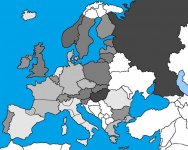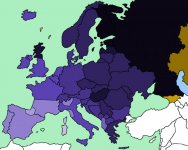LeBrok
Elite member
- Messages
- 10,261
- Reaction score
- 1,617
- Points
- 0
- Location
- Calgary
- Ethnic group
- Citizen of the world
- Y-DNA haplogroup
- R1b Z2109
- mtDNA haplogroup
- H1c
Alcohol (ethanol) is a very potent mind altering substance, and has very addictive properties.
Therefore, the question is, why some populations cope well with alcohol, which is a normal part of their culture, when others have rampant problem with alcoholism and considers alcohol as biggest evil?
I think this extremely various effect of alcohol on populations have roots in history of alcohol invention, long use by some demographics, therefore acquiring genetic predispositions, or lack of them.
"The gift of farmers". Oldest archeological finds point to ancient farming communities as inventors of alcoholic beverages like wine or beer.
Oldest european beer 4,400BC in Spain
http://www.pasthorizonspr.com/index...tual-includes-earliest-evidence-european-beer
Wine making from 4,500 in Macedonia
http://en.wikipedia.org/wiki/History_of_wine
Some finds date even further back in Near East and China in farming communities. Also farmers like Aztecs in America invented alcohol.
I'm not aware of any archeological finds of alcoholic drinks among hunter-gatherers. It is also true to modern HG like Prairie Indians or Australian Aborigines. They didn't have history of alcoholic beverages, didn't build immunity against alcohol toxicity, and they are also most affected of all modern populations on Earth having unparalleled problem with alcohol dependency.
Finally I was able to trace and excellent paper regarding alcoholism and other effects of alcohol dependency:
http://amphoraproject.net/w2box/data/AMPHORA Reports/CAMH_Alcohol_Report_Europe_2012.pdf
I made a quick map of alcohol dependency in Europe based on tables from this paper (Web Appendix 12: Prevalence of Alcohol Dependence, by Country ). The lightest shade marks the least dependent and goes up by factor of 3% a shade. There is data missing from Yugoslavia, Albania, Ukraine and Belarus but regardless, the trend is already visible. Alcoholism climbs from Southwest to Northeast.

It correlates with cline of ANE admixture. Darker colour denotes more ANE.

I will claim that from all 3 admixtures (EEF, WHG and ANE) ANE people were acquainted with alcohol very late and as last. ANE didn't build immunity yet to the same level as other admixtures, possibly as late comer to Europe.
Interesting how Hungary stands out in both maps.
Therefore, the question is, why some populations cope well with alcohol, which is a normal part of their culture, when others have rampant problem with alcoholism and considers alcohol as biggest evil?
I think this extremely various effect of alcohol on populations have roots in history of alcohol invention, long use by some demographics, therefore acquiring genetic predispositions, or lack of them.
"The gift of farmers". Oldest archeological finds point to ancient farming communities as inventors of alcoholic beverages like wine or beer.
Oldest european beer 4,400BC in Spain
http://www.pasthorizonspr.com/index...tual-includes-earliest-evidence-european-beer
Wine making from 4,500 in Macedonia
http://en.wikipedia.org/wiki/History_of_wine
Some finds date even further back in Near East and China in farming communities. Also farmers like Aztecs in America invented alcohol.
I'm not aware of any archeological finds of alcoholic drinks among hunter-gatherers. It is also true to modern HG like Prairie Indians or Australian Aborigines. They didn't have history of alcoholic beverages, didn't build immunity against alcohol toxicity, and they are also most affected of all modern populations on Earth having unparalleled problem with alcohol dependency.
Finally I was able to trace and excellent paper regarding alcoholism and other effects of alcohol dependency:
http://amphoraproject.net/w2box/data/AMPHORA Reports/CAMH_Alcohol_Report_Europe_2012.pdf
I made a quick map of alcohol dependency in Europe based on tables from this paper (Web Appendix 12: Prevalence of Alcohol Dependence, by Country ). The lightest shade marks the least dependent and goes up by factor of 3% a shade. There is data missing from Yugoslavia, Albania, Ukraine and Belarus but regardless, the trend is already visible. Alcoholism climbs from Southwest to Northeast.

It correlates with cline of ANE admixture. Darker colour denotes more ANE.

I will claim that from all 3 admixtures (EEF, WHG and ANE) ANE people were acquainted with alcohol very late and as last. ANE didn't build immunity yet to the same level as other admixtures, possibly as late comer to Europe.
Interesting how Hungary stands out in both maps.

